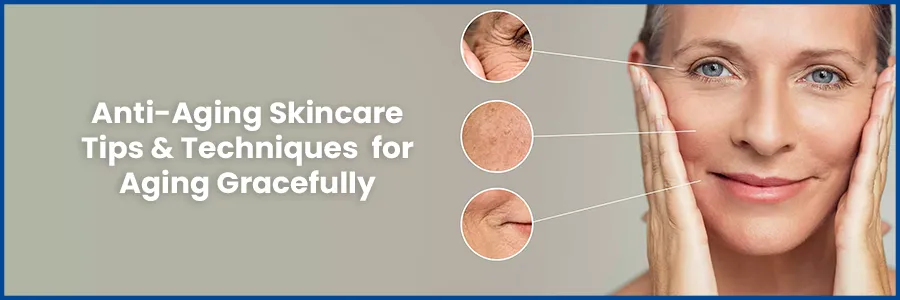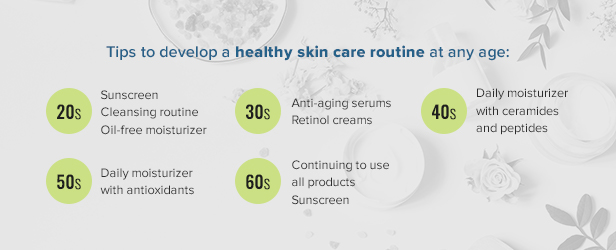Anti-aging skincare is a topic that resonates deeply with many individuals seeking to maintain youthful, radiant skin as they age. With advances in dermatological research and Anti-ageing products flooding the market, understanding effective anti-aging practices is crucial. This guide delves into evidence-based tips and strategies aimed at preserving skin health, minimizing wrinkles, promoting a vibrant complexion anti-ageing the Aging Process.
Before diving into skincare tips, one must grasp the biological mechanisms behind aging skin. Aging is a natural process influenced by both intrinsic (genetic) and extrinsic (environmental) factors. Inherent ageing involves genetically programmed changes, such as ageingcreaseAgeinglagen production and slower cell turnover. On the other hand, extrinsic ageing is accelerated by sun exposure, pollution, smoking, and other lifestyle factors.
Key Anti-Aging Skincare Tips
- Sun Protection: UV radiation is the primary ageing of premature aging. Use a broad-spectrum sunscreen with SPF 30 or higher daily, even on cloudy days. Reapply every 2 hours and wear protective clothing and hats when outdoors.
- CleageingGently: Avoid harsh soaps that strip natural oils from the skin. Opt for a gentle cleanser suitable for your skin type to remove dirt, makeup, and pollutants without causing irritation.
- Moisturize: Hydration is key to plump, youthful-looking skin. Choose a moisturizer containing ingredients like hyaluronic acid, glycerin, or ceramides to maintain function and prevent water loss.
- Anti-Aging Ingredients: Look for skincare products containing proven anti-aging ingredients such as retinoids (like retinol), vitamin C, peptides, and antioxidants (such as vitamAnti-Ageingreen tea extract). These ingredients can help improve skin tanti-ageingduce wrinkles, and enhance collagen production.
- Exfoliation: Regular exfoliation removes dead skin cells, promoting cell turnover and a smoother complexion. Use a gentle exfoliant (chemical or physical) 1-2 times per week, depending on your skin’s sensitivity.
- Healthy Diet: A balanced diet rich in antioxidants, vitamins (especially A, C, and E), omega-3 fatty acids, and phytonutrients supports skin health. Foods like berries, leafy greens, fatty fish, nuts, and seeds contribute to overall skin radiance.
- Hydration: Drink plenty of water throughout the day to be supported from within. Proper hydration supports skin elasticity and helps flush out toxins.
- Sleep: Adequate sleep is essential for skin repair and rejuvenation. Aim for 7-9 hours of quality sleep each night to optimize cellular turnover and collagen production.
- Stress Management: Chronic stress accelerates aging by increasing cortisol levels, which can break down collagen. Practice stress-reducing techniques such as meditation, yoga, or deep breathing exercises.
- Avoid Smoking and Liageingglcohol: Smoking contributes to premature skin aging by constricting blood vessels and depleting oxygen levels. Excessive alcohol consumption can dehydrate the skin and impair overall skin health.
- Regular Exercise: Physical activity improves circulation, delivering oxygen and nutrients to the skin cells. It also promotes collagen production and helps maintain a healthy weight, which can reduce the appearance of aging.
- Eye Care: The delicate skin around the eyes is prone to fine lines and wrinkles. Use a specialized eye cream with peptides or hyaluronic acid to hydrate and firm this area. Ageing and Neck: These areas often show signs of aging early. Apply sunscreen and moisturizer to your hands and neck daily, and consider using products formulated for these specific areas.
- Professional Treatments: Consider derm ageing treatments such as chemical peels, microdermabrasion, laser therapy, or injectables (like Botox or dermal fillers) for more pronounced anti-ageing effects. Consult with a dermatologist to determine the best options for your skin concerns.
Achieving and maintaining youthful skin requires a holistic approach combining anti-ageing practices, healthy lifestyle habits, and, when necessary, professional interventions. By understanding the aging process and implementing these evidence-based anti-aging tips, individuals can nurture their skin’s health and radiance over time. Remember, consistency and patience are keying long-term benefits from your anti-ageing santi-ageingutine.
Incorporate these tips into your daily regimen to protect and enhance your skin, empowering you to look and feel your best at every stage of life.
Thianti-ageing provides a thorough overview of anti-ageing skincare tips, highlighting the importance of protection, hydration, nutrition, and holistic care for maintaining youthful skin.
Advanced Anti-Aging Techniques and Innoanti-ageing yond the fundamental skincare practices mentioned earlier, advancements in dermatology and skincare science have introduced innovative techniques and ingredients that offer enhanced anti-aging benefits. These advanced methods target specific skin concerns and provide more intensive rejuvenation. Here are some notable techniques and innovations in anti-ageing anti-ageing
retinoids and Retinol: Retinoids, derivatives of vitamin A, are potent ingredients known for their ability to accelerate cell turnover, stimulate collagen production, and reduce the appearance of fine lines and wrinkles. Prescription-strength retinoids like tretinoin are available for more significant results, while over-the-counter retinol products offer a gentler approach suitable for most skin types.
Peptides: Peptides are amino acid chains that serve as building blocks for proteins like collagen and elastin. When applied topically, peptides can help stimulate collagen production, improve skin elasticity, and reduce the depth of wrinkles. Look for skincare products containing peptides such as palmitoyl pentapeptide-4 (Matrixyl) for anti-aging benefits.
Antioxidants: Antioxidants play a crucial role in neutralizing free radicals generated by UV radiation, pollution, and other environmental stressors that contribute to ageing. Vitamin C, in particular, is highly effective in protecting the skin from oxidative damage, brightening the complexion, and promoting collagen synthesis. Other antioxidant ageing vitamin E, green tea extract, and resveratrol also offer protective and anti-aging benefits.
Hyaluronic Acid: Known for its hydrating properties, hyaluronic acid is a natural molecule found in the skin that attracts and retains moisture. As we age, anti-ageing hyaluronic acid levels decrease, leading to dryness and loss of elasticity. Topical application of hyaluronic acid helps plump the skin, reduce the appearance of fine lines, and improve overall hydration.
Growth Factors: Growth factors are proteins naturally present in the skin that regulate cell growth, repair damaged skin, and maintain skin structure. Skincare products containing growth factors derived from stem cells or other sources can help rejuvenate aging skin by promoting cell renewal, enhancing skin texture, and reducing wrinkles.
Procedures and Treatments: For individuals seeking more immediate or intensive anti-ageing dermatological procedures and treatments provide targeted solutions. These may include:
- Chemical Peels: Chemical peels exfoliate the skin’s outer layers to impanti-ageingre, reduce fine lines, and promote cell turnover.
- Microdermabrasion: This non-invasive procedure uses a device to exfoliate and remove dead skin cells, stimulating collagen production and improving skin texture.
- Laser Therapy: Laser treatments target specific skin concerns such as wrinkles, pigmentation, and skin laxity by stimulating collagen production and promoting skin renewal.
- Injectables: Botulinum toxin injections (e.g., Botox) temporarily relax facial muscles to reduce wrinkles, while dermal fillers (e.g., hyaluronic acid fillers) restore volume and smooth lines and folds.
Nutritional Supplements: In addition to topical skincare products, nutritional supplements can support anti-aging efforts from within. Supplements containing antioxidants like vitamins C and E, as well as collagen peptides and omega-3 fatty acids, can help nourish the skin and enhance resilience against ageing.
Customized Skincare Regimens: Tailoring a skincare routine to individual skin concerns and goals is essential for optimizing anti-aging benefits. Consulting with a dermatolageing or skincare professional can help determine the most effective products and treatments based on skin type, sensitivity, and spatial ageing concerns.
The landscape of anti-aging skincare continues to evolve with ongoing research and technological advancements. From foundational practices such as sun protection and moisturization to advanced treat-ageing retinoids, peptides, and dermatological procedures, there are numerous strategies available to address and mitigate the visible signs of aging.
Regardless of age or skin type, adopting a comprehensive approach to anti-aging skincare—including both preventative measures and targeted treatments—can help individuals age and maintain healthy, youthful-looking skin. By combining multi-ageing skincare practices with a healthy lifestyle and, when appropriate, professional interventions, individuals can nurture their skin’s vitality and radiance for years to come.
Remember, consistency and patience are key when implementing anti-aging skincare techniques and innovations. Embrace a proactive approach to skincare to enhance your skin’s health and appearance, empowering you to feel confident and age Implementing these advanced techniques alongside fundamental skincare practices ensures a holistic approach to anti-aging, promoting long-term skin health and vitality.
Certainly! Let’s delve further into advanced anti-ageing skincare techniques and innovations, exploring additional strategi-gingering trends that contribute to maintaining youthful, healthy skin:
LED Light Therapy: LED (Light Emitting Diode) therapy uses different wavelengths of light to penetrate the skin at varying depths, stimulating cellular activity. Red light therapy, for example, boosts collagen production, reduces inflammation, and improves overall skin tone. Blue light therapy targets acne-causing bacteria and can help prevent breakouts, which is beneficial for maintaining clear, youthful skin.
Microneedling: Microneedling, also known as collagen induction therapy, involves using a device with fine needles to create tiny punctures in the skin’s surface. These micro-injuries stimulate the skin’s natural healing response, promoting collagen and elastin production. Microneedling can improve skin texture, reduce the appearance of scars, fine lines, and wrinkles, and enhance the penetration of topical skincare products.
Ultrasound Therapy: Ultrasound technology in skincare treatments utilizes sound waves to penetrate deep into the skin, promoting cellular renewal and collagen synthesis. Ultrasound therapy can improve skin elasticity, tighten sagging skin, and reduce the appearance of fine lines and wrinkles. It is non-invasive and suitable for various skin types.
Cryotherapy: Cryotherapy involves exposing the skin to extremely cold temperatures for a short period. Cryofacials and cryomasks help improve circulation, reduce inflammation, and tighten pores, resulting in smoother and more youthful-looking skin. Cryotherapy can also stimulate collagen production and enhance the skin’s natural glow.
Topical Stem Cell Therapy: Stem cells derived from plants or human sources are increasingly used in skincare products for their regenerative properties. These stem cells contain growth factors and antioxidants that can help repair damaged skin, improve elasticity, and reduce the appearance of wrinkles. Topical stem cell serums and creams aim to rejuvenate the skin at a cellular level.
Biohacking Skincare: The concept of biohacking extends to skincare, where individuals customize their routines based on genetic predispositions, lifestyle factors, and environmental influences. Personalized skincare formulations, genetic testing for skincare recommendations, and tracking skin health metrics (such as hydration levels and collagen density) are becoming more prevalent in anti-aging skincare practices.
Nanotechnology in Skincare: Nanotechnology involves using microscopic particles to deliver active ingredients deeper into ski-ageing and efficacy. Nanoparticles can encapsulate antioxidants, peptides, and other anti-ageing compounds, allowing for targeted delivery and prolonged release. This technology maximizes the benefits of skincare products and improves their penetration into the skin’s layers.
Anti-Pollution Skincare: Urban living exposes the skin to pollutants, which can accelerate aging and lead to dullness, pigmentation, and inflammation. Anti-pollution skincare products contain ingredients like antioxidants, barrier-repairing agents, and detox ageing extracts (such as moringa or algae) to protect against environmental stressors and maintain skin health.
Holistic Approaches: Integrating holistic practices into skincare routines emphasizes overall well-being and its impact on skin health. This includes mindfulness techniques, stress management, dietary adjustments, and holistic therapies (such as acupuncture or facial massages) that promote relaxation, reduce inflammation, and support skin regeneration.
Innovative Ingredients: Continuous research into skincare ingredients has led to the discovery and utilization of novel compounds with anti-aging properties. Examples include bakuchiol (a natural alternative to retinol), niacinamide (vitamin B3), epidermal growth factors (EGFs), and marine extracts anti-ageing and seaweed) known for their hydrating and rejuvenating effects on the skin.
The realm of anti-ageing skincare is dynamic and multifaceted, with a wide array of techniques and innovations available to address diverse skin concerns and goals. From advanced treatments like microneedling and LED therapy to cutting-edge ingredients and personalized skincare approaches, individuals have more options than ever to maintain youthful, radiant skin.
It’s essential to approach anti-aging skincare holistically, combining proven practices with emerging technologies and personalized strategies tailored to individual needs. Consulting with a dementia-ageing or skincare specialist can provide valuable guidance in selecting the most effective treatments and products based on skin type, concerns, and desired






Pingback: Role of SPF in Skincare: Why Protection Against the Sun’s Rays is Vital – THE FAST JOBS